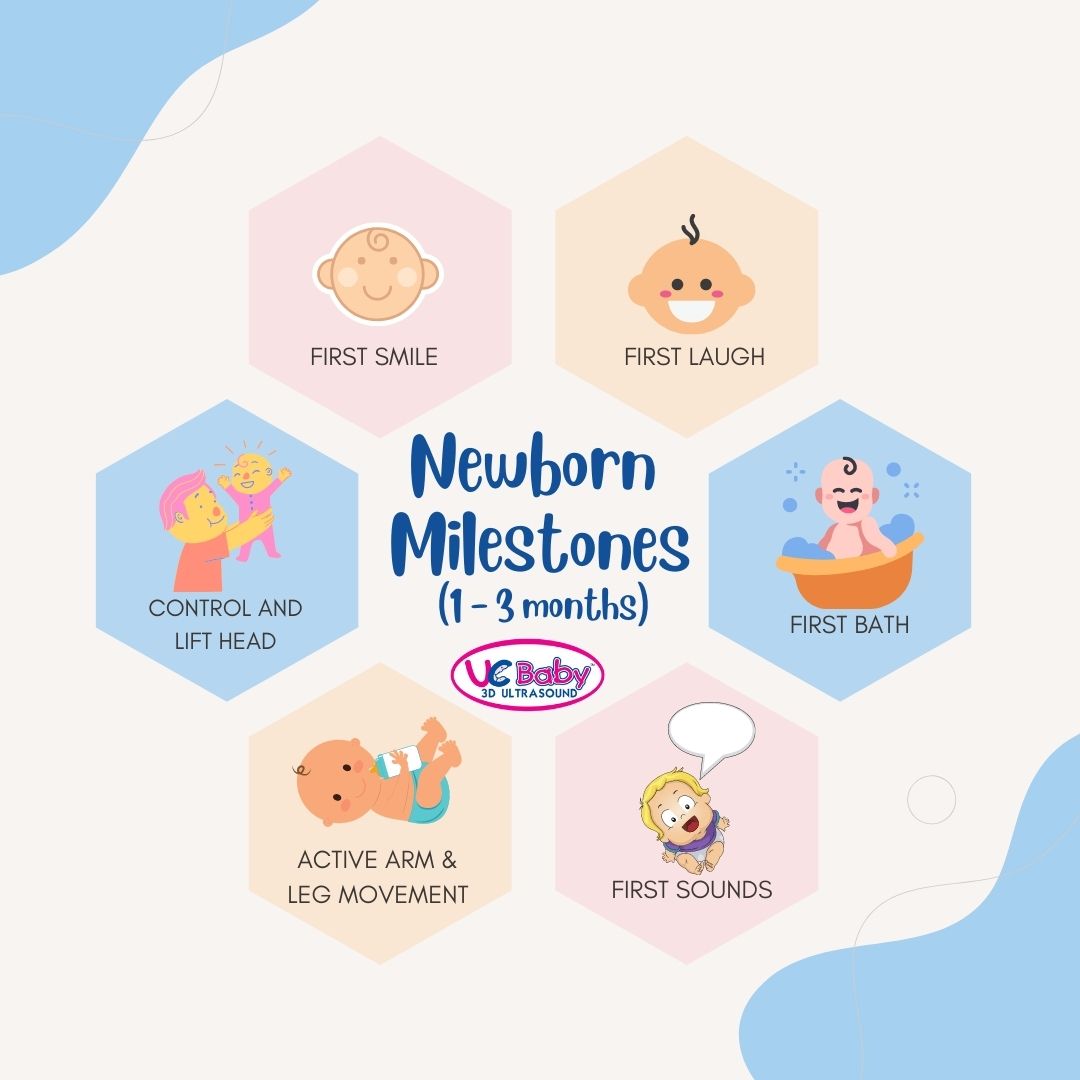Newborn milestones are behavioral checkpoints in a baby’s development as they grow. These are the core skills all babies should be reaching around this age. From their first smile to their first push up on their own little arms!
Bear in mind, your baby might reach some developmental milestones ahead of schedule and lag behind on others. This is completely normal. By the time your baby is three months of age, he/she will have made a dramatic transformation from an independent newborn to a sociable, responsive infant.
First Smile
The first time your baby smiles at you, all those sleepless nights and morning sickness will all be worth it. Smiling is also a welcome sign of a baby’s growing social skills now that your baby is making the transition from a sweet sleepy baby to an active, little person.
You can encourage your baby to grin by smiling at him/her, cuddling, playing, and talking to your little one often.
First Laugh
Your baby’s first laugh should come shortly after your baby starts experimenting with making sounds from coo’s to gurgles to sighs. Once you hear that first giggle, you won’t be able to get enough of that sound!
Many babies laugh for the first time around 3 or 4 months old, although it varies for each baby. You can try (and probably succeed) making your baby laugh by making funny faces, goofy dances, or silly sounds. Enjoy discovering what makes your little one light up with laughter and continue to encourage the chuckles by talking with your baby often.
Keep in mind, newborns can be a tough crowd. Don’t be worried if your humor may produce more tears than giggles at first, especially near feeding time or bedtime.
First Bath
Bath time can be a slippery business, but don’t stress, you’ll soon be a pro. Your newborn baby will only really need a bath two or three times a week.
At first, give him/her a sponge bath until the umbilical cord stump heals, then a baby tub bath, and eventually a tub bath (when baby can sit on his/her own). Always make sure to check the water temperature on your forearm before bathing the baby.
Benefits of Bath Time for Babies:
- Learning experience for baby
- Soothes fussy babies
- Induces sleep
- Boosts parent-baby bond
First Sounds
Hold on… What was that sound that just came from your baby? If it wasn’t a whimper, a burp, or an explosion from his/her back end… that surprising noise was most likely a coo!
Your little one will learn to baby talk in stages and test out all the sighs, coos, grunts, and gurgles you could imagine. These are those first steps closer to your baby’s first words. There’s nothing more adorable (and hilarious) than a baby trying to make its first sounds.
You may expect to hear these noises anytime between the first few weeks and the second month. To help your baby discover his/her monologue, you can pick up the conversation by cooing and talking back. This will be especially satisfying for your baby and will eventually lead to the first special “mama” or “dada”.
Babies love being talked to and listening to your language and mimicking them back to you is how they learn to talk!
Tips on How to Talk to Your Baby:
- Narrate your day, step by step
- Hold (one-sided) conversations
- Read to your baby
- Describe the sights and sounds of your surroundings
- Ask questions – and listen if your baby answers
Control and Lift Head
It can certainly be anxious passing your newborn over to anyone with little to no experience holding babies and until your baby gains control over their neck muscles you want to make sure that little noggin is supported at all times!
Usually, around 3 months of age is when most babies develop enough strength in their neck to keep their head partially upright. You’ll notice them gain full control usually around 6 months.
Early head lifts can occur around one month old, usually during tummy time! This practice plays a role in developing the surrounding muscles in the shoulders, arms, and back that will help your baby become more mobile later on.
It’s a good idea to lay your baby down on their tummy for a few minutes at a time, a few times per day, and remember to always supervise the baby during the tummy time session.
If your child is missing any milestones, be sure to talk with your healthcare provider. Missing one or two abilities should not cause harm as every child develops differently.
References:
Baby Growth and Development: 1-3 Month Milestones
When Will My Baby Hold Their Head Up on Their Own?
Written by: Melissa Ureten






 Invite families and friends to witness this memorable event of your pregnancy. Celebrate that special child-bonding moment with your loved ones, wherever they are in the world.
Invite families and friends to witness this memorable event of your pregnancy. Celebrate that special child-bonding moment with your loved ones, wherever they are in the world. There is nothing more beautiful than your baby's heartbeats. Save that sound forever in a UC Baby® Heartbeat Bear®. It's not just a great keepsake, but also an effective way to sooth your baby to sleep.
There is nothing more beautiful than your baby's heartbeats. Save that sound forever in a UC Baby® Heartbeat Bear®. It's not just a great keepsake, but also an effective way to sooth your baby to sleep.

